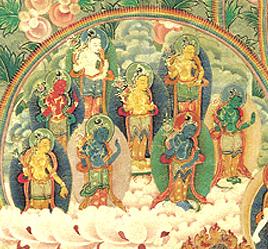Bodhisattva vow: Difference between revisions
Jump to navigation
Jump to search
(New page: '''Bodhisattva vow''' (wyl. ''byang sdom'') - the commitment to become a bodhisattva, one who works to lead all sentient beings to perfect enlightenment. ==Traditions of Bodhisatt...) |
|||
| (16 intermediate revisions by 4 users not shown) | |||
| Line 1: | Line 1: | ||
'''Bodhisattva vow''' ([[ | [[Image:Bodhisattva.JPG|frame|[[Bodhisattva]] [[sangha]] from the [[Longchen Nyingtik]] Field of Merit]] | ||
'''Bodhisattva vow''' (Tib. [[བྱང་སྡོམ་]], [[Wyl.]] ''byang sdom'') — the commitment to become a [[bodhisattva]], one who works to lead all [[sentient beings]] to perfect [[enlightenment]]. | |||
==Traditions of Bodhisattva Vow== | ==Traditions of Bodhisattva Vow== | ||
There are two main traditions of bodhisattva vow: the tradition of '''Profound View''', coming from [[Nagarjuna]], and the tradition of '''Vast Conduct''', coming from [[Asanga]]. In Asanga's tradition the vows of [[bodhichitta in aspiration]] and [[bodhichitta in action]] are taken separately, whereas in Nagarjuna's tradition they are taken together. | There are two main traditions of bodhisattva vow: the tradition of '''[[Profound View]]''', coming from [[Nagarjuna]], and the tradition of '''[[Vast Conduct]]''', coming from [[Asanga]]. In Asanga's tradition the vows of [[bodhichitta in aspiration]] and [[bodhichitta in action]] are taken separately, whereas in Nagarjuna's tradition they are taken together. | ||
==How to Take the Bodhisattva Vow== | |||
The vow consists of the preliminary practices, main part and conclusion. | |||
*The '''preliminaries''' can consist of gathering the accumulations by means of the [[seven branch offering]], training the mind and giving away the [[three possessions]]. | |||
*The '''main part''' consists of taking the vows of bodhichitta in aspiration and action, either separately or together. | |||
*The '''conclusion''' consists of rejoicing oneself and encouraging others to rejoice as well. | |||
==When the Bodhisattva Vow was Granted to [[About Rigpa|Rigpa]] Students== | |||
*[[Khenchen Pema Sherab]], [[Lerab Ling]], 2 June 2015 | |||
==Further Reading== | |||
*[[Bokar Rinpoche]], ''Taking the Bodhisattva Vow'' (Clearpoint Press, 1991) | |||
*[[Philippe Cornu]], ''Manuel de bouddhisme — Philosophie, pratique et histoire. Tome II, Bouddhisme Mahāyāna'' (Editions Rangdröl, 2019), pages 86-94. | |||
*Geshe Sonam Rinchen, ''The Bodhisattva Vow'', translated and edited by Ruth Sonam (Ithaca: Snow Lion, 2000) | |||
*Jamgön Kongtrul Rinpoche, ''The Treasury of Knowledge, Book Five: Buddhist Ethics'' (Ithaca: Snow Lion, 2003) | |||
*Ngari Panchen, ''Perfect Conduct: The Absolute Certainty of the Three Vows with commentary by Dudjom Rinpoche'' (Boston: Wisdom, 1996) | |||
*Sakya Pandita Kunga Gyaltsen, ''A Clear Differentiation of the Three Codes: Essential Distinctions among the Individual Liberation, Great Vehicle, and Tantric Systems'', translated by Jared Rhoton (New York: SUNY, 2002) | |||
==Internal Links== | |||
*[[Eighteen root downfalls]] | |||
*[[Twenty Verses on the Bodhisattva Vow]] | |||
==External Links== | ==External Links== | ||
* | *{{LH|tibetan-masters/patrul-rinpoche/bodhisattva-vow|''The Ritual for the Bodhisattva Vow according to the Tradition of Patrul Rinpoche'' arranged by Chatral Rinpoche}} | ||
[[Category: | [[Category:Vows and commitments]] | ||
[[Category:Bodhichitta]] | |||
Revision as of 15:34, 3 April 2021

Bodhisattva vow (Tib. བྱང་སྡོམ་, Wyl. byang sdom) — the commitment to become a bodhisattva, one who works to lead all sentient beings to perfect enlightenment.
Traditions of Bodhisattva Vow
There are two main traditions of bodhisattva vow: the tradition of Profound View, coming from Nagarjuna, and the tradition of Vast Conduct, coming from Asanga. In Asanga's tradition the vows of bodhichitta in aspiration and bodhichitta in action are taken separately, whereas in Nagarjuna's tradition they are taken together.
How to Take the Bodhisattva Vow
The vow consists of the preliminary practices, main part and conclusion.
- The preliminaries can consist of gathering the accumulations by means of the seven branch offering, training the mind and giving away the three possessions.
- The main part consists of taking the vows of bodhichitta in aspiration and action, either separately or together.
- The conclusion consists of rejoicing oneself and encouraging others to rejoice as well.
When the Bodhisattva Vow was Granted to Rigpa Students
- Khenchen Pema Sherab, Lerab Ling, 2 June 2015
Further Reading
- Bokar Rinpoche, Taking the Bodhisattva Vow (Clearpoint Press, 1991)
- Philippe Cornu, Manuel de bouddhisme — Philosophie, pratique et histoire. Tome II, Bouddhisme Mahāyāna (Editions Rangdröl, 2019), pages 86-94.
- Geshe Sonam Rinchen, The Bodhisattva Vow, translated and edited by Ruth Sonam (Ithaca: Snow Lion, 2000)
- Jamgön Kongtrul Rinpoche, The Treasury of Knowledge, Book Five: Buddhist Ethics (Ithaca: Snow Lion, 2003)
- Ngari Panchen, Perfect Conduct: The Absolute Certainty of the Three Vows with commentary by Dudjom Rinpoche (Boston: Wisdom, 1996)
- Sakya Pandita Kunga Gyaltsen, A Clear Differentiation of the Three Codes: Essential Distinctions among the Individual Liberation, Great Vehicle, and Tantric Systems, translated by Jared Rhoton (New York: SUNY, 2002)